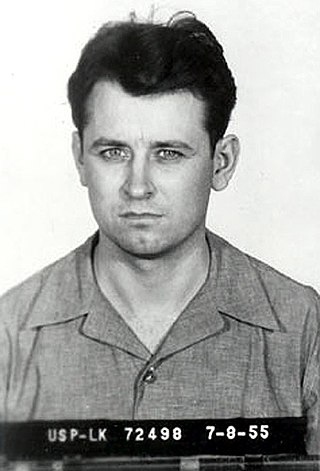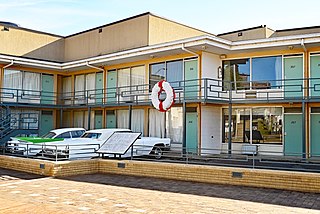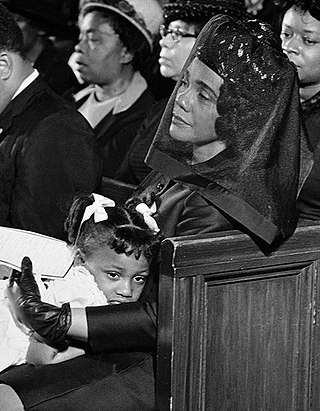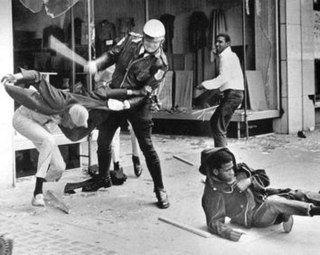
A compactor is a machine or mechanism used to reduce the size of material such as waste material or bio mass through compaction. A trash compactor is often used by business and public places like hospitals to reduce the volume of trash they produce. A baler-wrapper compactor is often used for making compact and wrapped bales in order to improve logistics.
Jerome Wurf was a U.S. labor leader and president of the American Federation of State, County and Municipal Employees (AFSCME) from 1964 to 1981. Wurf was a friend of Martin Luther King Jr., and was arrested multiple times for his activism, notably during the Memphis sanitation strike. He was present for King's "I've Been to the Mountaintop" oratory at the strike, the day before King was assassinated, and attended King's funeral.

The National Civil Rights Museum is a complex of museums and historic buildings in Memphis, Tennessee; its exhibits trace the history of the civil rights movement in the United States from the 17th century to the present. The museum is built around the former Lorraine Motel, which was the site of the 1968 assassination of Martin Luther King Jr. Two other buildings and their adjacent property, also connected with the King assassination, have been acquired as part of the museum complex.
James Joseph Reynolds Jr. was the Under Secretary of Labor during the Lyndon B. Johnson Administration in the United States. Earlier he served as Assistant Secretary for Labor-Management Relations from 1961 to 1965, initially for President John F. Kennedy. Reynolds was an industrialist, and had been a member of the National Labor Relations Board under President Harry S. Truman.
Henry Loeb III was an American politician of the Democratic Party, who was mayor of Memphis, Tennessee, for two separate terms in the 1960s, from 1960 through 1963, and 1968 through 1971. He gained national notoriety in his second term for his role in opposing the demands of striking sanitation workers in early 1968. A segregationist, he opposed civil rights for African Americans and promoted white supremacy, continuing former Memphis mayor and political boss E. H. Crump's legacy.

The Memphis sanitation strike began on February 12, 1968, in response to the deaths of sanitation workers Echol Cole and Robert Walker. The deaths served as a breaking point for more than 1,300 African American men from the Memphis Department of Public Works as they demanded higher wages, time and a half overtime, dues check-off, safety measures, and pay for the rainy days when they were told to go home.

"I've Been to the Mountaintop" is the popular name of the last speech delivered by Martin Luther King Jr.

James Earl Ray was an American fugitive who was convicted for the assassination of Martin Luther King Jr. at the Lorraine Motel in Memphis, Tennessee, on April 4, 1968. After the assassination, Ray fled the United States and was captured in the United Kingdom. Ray was convicted in 1969 after entering a guilty plea—thus forgoing a jury trial and the possibility of a death sentence—and was sentenced to 99 years of imprisonment.

Martin Luther King Jr., an African-American clergyman and civil rights leader, was fatally shot at the Lorraine Motel in Memphis, Tennessee, on April 4, 1968, at 6:01 p.m. CST. He was rushed to St. Joseph's Hospital, where he died at 7:05 p.m. He was a prominent leader of the civil rights movement and a Nobel Peace Prize laureate who was known for his use of nonviolence and civil disobedience.
The Mountaintop is a play by American playwright Katori Hall. It is a fictional depiction of Martin Luther King Jr.'s last night on earth set entirely in Room 306 of the Lorraine Motel on the eve of his assassination in 1968.

Clayborn Temple, formerly Second Presbyterian Church, is a historic place in Memphis, Tennessee, United States. It was listed on the National Register of Historic Places in 1979 for local architectural significance. It was upgraded to national significance under Clayborn Temple in 2017 due to its role in the events of the Sanitation Workers' Strike of 1968. The historic structure was sold to the A.M.E. Church in 1949, which named the building after their bishop.

The first memorial service following the assassination of Martin Luther King Jr. on April 4, 1968, took place the following day at the R.S. Lewis Funeral Home in Memphis, Tennessee. This was followed by two funeral services on April 9, 1968, in Atlanta, Georgia, the first held for family and close friends at Ebenezer Baptist Church, where King and his father had both served as senior pastors, followed by a three-mile procession to Morehouse College, King's alma mater, for a public service.
The Witness: From the Balcony of Room 306 is a 2008 documentary short film created to honor the 40th annual remembrance of the life and death of Martin Luther King Jr. Directed by Adam Pertofsky, the film received a 2008 Oscar nomination in the "Best Documentary Short Subject" Category at the 81st Academy Awards.

The King assassination riots, also known as the Holy Week Uprising, were a wave of civil disturbance which swept across the United States following the assassination of Martin Luther King Jr. on April 4, 1968. Some of the biggest riots took place in Washington, D.C., Baltimore, Chicago, and Kansas City.
The St. Petersburg sanitation strike of 1968 was a labor strike by city sanitation workers in St. Petersburg, Florida that lasted an estimated four months. The strike of 1968 was one of three labor strikes that took place within three years by city sanitation workers, who cited grievances of pay inequality and poor working conditions. A wage dispute over a newly implemented 48-hour work week triggered the sanitation strike which lasted 116 days. 211 sanitation workers participated in the work stoppage, 210 of whom were African-American. The racial makeup of the strikers increased tensions surrounding the work stoppage and impaired social race relations in the city.Strikers participated in nonviolent marches, economic boycotts, picketing, and human blockades which eventually turned violent with four nights of riots. During the four-month strike, sanitation crew chief Joe Savage led nearly 40 marches down to City Hall, and participated in nonviolent protests which resulted in mass arrests. The strike gained the attention of local and national civil rights advocates, designating this as a significant event in the city's history.

Larry Payne was a sixteen-year old African American teenager who was killed following a march in support of the Memphis sanitation strike on Thursday, March 28, 1968, in Memphis, Tennessee. He was the only fatality on that day although the New Pittsburgh Courier reported 60 injured and 276 arrested.
Charles F. Gordon, known professionally as OyamO, is an American playwright and professor. He is currently a writer-in-residence at the University of Michigan.

Conspiracy theories about the assassination of Martin Luther King Jr., a prominent leader of the civil rights movement, relate to different accounts of the incident that took place on April 4, 1968, in Memphis, Tennessee. King was assassinated on the balcony of the Lorraine Motel, the day after giving his final speech "I've Been to the Mountaintop". Claims soon arose over suspect aspects of King's assassination and the controversial role of the alleged assassin, James Earl Ray. Although his guilty plea eliminated the possibility of a trial before a jury, within days, Ray had recanted and claimed his confession was forced. Suspicions were further raised by the confirmation of illegal surveillance of King by the FBI and the CIA, and the FBI's attempt to prompt King to commit suicide.

Memphis, Martin, and the Mountaintop: The Sanitation Strike of 1968 is a 2018 children's picture book told in poetry and prose by writer Alice Faye Duncan and illustrator R. Gregory Christie, published by Calkins Creek.
The Atlanta sanitation strike of 1977 was a labor strike involving sanitation workers in Atlanta, Georgia, United States. Precipitated by wildcat action in January, on March 28 the local chapter of the American Federation of State, County and Municipal Employees (AFSCME) agreed to strike. The main goal of the strike was a $0.50 hourly wage increase. With support from many community groups, Atlanta mayor Maynard Jackson resisted the strike, firing over 900 striking workers on April 1. By April 16, many of the striking workers had returned to their previous jobs, and by April 29 the strike was officially ended.












